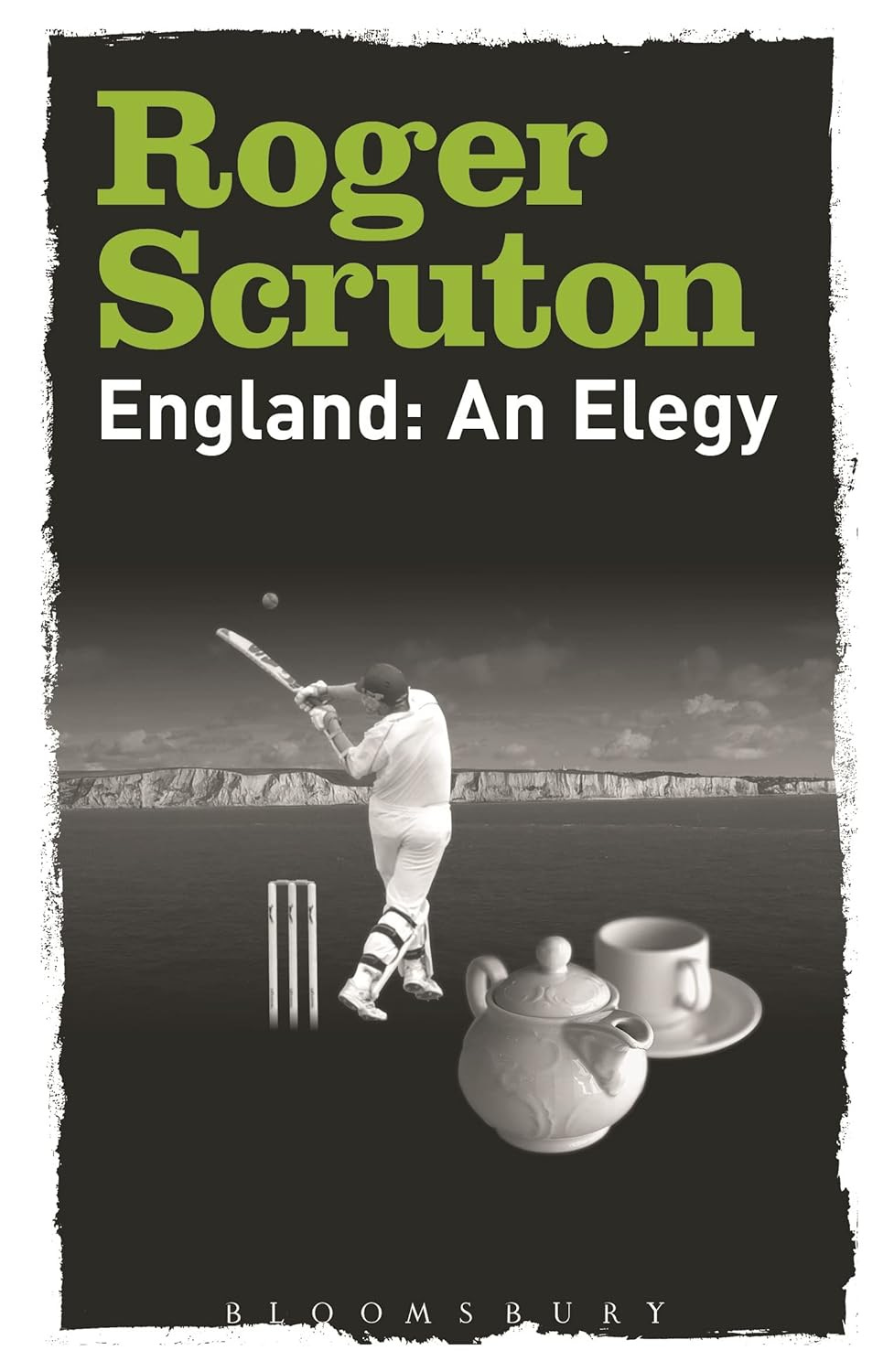The English Practice of Joining Things
Thoughts on 'Community as Person', the fourth chapter of Roger Scruton's England: An Elegy
The term IRL (in real life) reflects much of what is wrong today. Nowadays, many spend so much time online that they feel the need to use this term to designate life that is not dependent on the internet. It is a symptom of a society where atomisation and disconnection from nature are problems. Unsurprisingly, reports of a loneliness epidemic and commentary on a crisis of meaning abound.1 We might find the solution to the problems of atomisation, loneliness and meaning in the English practice of ‘joining things’, membership and club building Roger Scruton recognises in England: An Elegy. Participating in social activities that one enjoys may help to abate feelings of isolation and disconnection. Such initiatives can address various health, social, cultural, educational and career concerns.
In chapter three, Scruton detects ‘every village was a centre of spontaneous institution building, with its football club and cricket club, its Boy Scouts and Girl Guides, its Women’s Institute and it circles of amateurs devoted to needlework, music, photography, theatricals, brass bands, jam-making, and ballroom dancing. Societies of amateurs existed elsewhere in Europe, and especially under the aegis of the Austro-Hungarian Empire. Nevertheless, the English case was exceptional. For the common law gave credibility to private initiatives and protected them from the jealousy of legislators.’2 In the chapter, Community as Person, Scruton expands on the subject and explains how clubs and institutions can assume the form of a ‘corporate person’. The term refers to an organisation legally separate from its members. Scruton asserts ‘this legal construct gives judicial recognition to a social fact. Every form of human membership casts a shadow, which marches behind and in front of us, that takes on a moral reality of its own. It is the product of our decisions, but also gradually transcends them, becoming an object of loyalty, affection or resentment, just like you and me.’ ‘It is through ties of membership that we become fully persons, deriving from these artificial persons the sense of identity without which the natural person remains incomplete and unfulfilled.’3
Takeaway boxes, plates, cups and cutlery climb high as monuments to his fecklessness. As if by religious decree, knob cheese rests under his foreskin.
Clubs do not have to be legally recognised corporations to be healthy organisations possessing an identity independent of the interests of any one individual, and they can start quickly. Groups can arise from charitable endeavours when caring members of society do their best to ensure people in poor situations are not left behind. The proverbial ‘‘basement dweller’’ is one of the most tragic manifestations of the contemporary West. Under the heading of a ‘new word suggestion’, Collins Dictionary states a basement dweller is: ‘A constantly online argumentative loser, assumed to be living in their parent's basement.’ Kinder definitions note basement dwellers as geeks or nerds who lack a social life.4 At least the label geek or nerd can imply intelligence. The term basement-dweller generally suggests something dire, as the Collins definition attests.

I will describe an imagined basement- dweller. Roy is an indolent twenty-six-year-old. He is socially awkward, usually in solitude, and bereft of ambition. He is overweight and seldom moves far from his bed, on which the shape of his arse is fixed. The computer screen and the game console form his basis for existence. Takeaway boxes, plates, cups and cutlery climb high as monuments to his fecklessness. As if by religious decree, knob cheese rests under his foreskin. Clothing messily covers the floor around him; he cannot readily tell the difference between worn underwear and that unworn since the last clean. Sometimes, he only has an advisory skid to go by. Roy attends a job centre once a fortnight and signs on after stifling the odd laugh when overhearing people talk about making genuine job applications. Roy’s life is a sort of zoological up and down with gadgets.
The example of Roy is extreme but more common than some might believe, and plenty continue in this way to varying degrees. A panacea for Roy does not exist, but someone wants to help. A clever and caring man with a philanthropic spirit tries to motivate Roy; his name is Ben. Ben knows about Roy’s lifestyle; he is his neighbour. Roy’s mother tells Ben she worries her son will waste his life. Ben understands that to encourage Roy, he must start in a small way. He builds a rapport with Roy by talking to him about video games. He persuades him to turn his interest from a solitary one into a social activity and explains how this might improve his well-being.
Ben approaches a local club that hosts people who play video games. He tells the staff he is working to try and help isolated individuals become more social. He requests permission to start a small club for them. The club agrees to facilitate this. In addition to Roy, Ben works with others in similar situations. He manages to cajole Roy and a couple more people to attend the first meeting of the group. When devising his plan to bring atomised people into positive social surroundings, Ben understands that those he joins together should be culturally compatible.
To Ben’s satisfaction, Roy, Barry and Lewis attend the first meeting. Lewis strikes up a conversation with Roy. When Lewis tells him his gaming avatar is Ironclad456990, Roy knows who he is. The pair have encountered each other many times online. The trio bond and meet up weekly to play games. They develop social skills and start to behave maturely. Whereas at home, console controllers would slam, and expletives would abound following defeat, such actions are more unacceptable in public. The trio learn to take losses with grace and maintain discipline when frustrated.
As the weeks pass, the group becomes more popular, and its size swells. Ben empowers Roy to take a leading role in managing the club. Ben calls the club Atom; this is a nod to the atomised state of its initial members before they made changes. Along with Lewis and Barry, Roy designs membership cards, arranges special tournaments, and institutes a system that involves members paying small fees towards buying video games for the group.
Through spending time with Ben and listening to his advice, Roy now sees value in pursuing personal development. Revitalised by the community and responsibility Atom has provided, Roy improves his life on a general basis. Some women have joined Atom; Roy becomes more self-conscious than he was. He starts to wash regularly, and with his peers, he accepts Ben’s suggestion that the club adopt a physical health dimension. Members begin to go running, to the gym and on hikes with each other. Ben has instilled a community-minded ethos in his proteges; this manifests when Atom members start to litter-pick, help the poor and look out for the elderly. Before Ben came along, many young adults he supports were not in employment, education, or training (NEET). Thanks in no small part to his efforts, participants find jobs and achieve other successes. Roy lands a job at a games shop. He continues to build confidence under Ben’s mentorship and starts to research study options to achieve his goal of being a game developer.
Buoyed by the success of his initiative, Ben develops an educational component for Atom. He cannot manage the growing Atom project alone, so he enlists scholars who want to edify members by using Western tradition to inspire them.
Ben formalises his efforts by establishing Atom as a company. It is now a corporate person. Atom hosts its first Annual General Meeting (AGM). Looking sharp in a new suit and no longer overweight, Roy chairs the meeting and presents awards for achievements to Atom members. For him, his life change was a case of the obstacle becoming the way.
Roy’s remarkable transformation reflects what a club steered by wholesome motives might achieve. Roy’s life was pathetic. By someone reaching out and encouraging him to connect with others, he changed his life and contributed to Atom’s expansion.
Video games are often deprecated and deemed synonymous with laziness and failure. Sometimes, this view has merit, but it is not always fair. They are no less worthy than a host of other leisure activities. Like other things in life, moderation matters.
Amid the loneliness and lack of meaning people experience, an organisation like Atom that uses leisure, fitness and education could enhance lives. Clubs and institutions should look to salvage the potential of those struggling and not cast them aside; this makes sense from a humanitarian and economic perspective.
At the time of writing, content creator Richard the Fourth (who makes videos for YouTube and writes on Substack) is publicising a group work, coaching, and mentoring programme centred on helping men. He intends to help participants confront their demons, let go of resentments, embrace a simpler mode of being and develop spiritually. His course emphasises tradition and navigating our materialistic and nihilistic age. Direction on women and relationships features, and so does the importance of making a solid living. Although his project is in the mould of self-help rather than club or organisation building, these things need not be mutually exclusive. It is easy to envisage the integration of his schema into a more substantive and broader movement.5 He recently indicated an intention to connect young men during a conversation with Benjamin Boyce on YouTube.6 Today’s society, which is in many ways characterised by atomisation, loneliness, alienation and cultural ruin, is ripe for the emergence of initiatives that tackle these issues.
Schemes connecting people need not be grand or focused on improving the wretched. Initiatives for ordinary people that provide a sense of meaning and belonging can easily begin. Many lament the attacks on our literature motivated by leftist ideas.7 Book clubs committed to reading, discussing, and championing works that are in the crosshairs could be very popular.
Associations dedicated to writing, poetry, painting, and drawing could build on the achievements of the past and flourish within our cultural paradigm. Cultural efflorescence can only happen when enough talented people commit to creating culture rather than bewailing the state of things.
Institutions supportive of English bonds of kinship and shared culture were a given in the England described by Scruton; this is not the case today. The imagining of Roy and Atom describes how a resurgence of a clubbable culture could reduce problems pertaining to atomisation, loneliness and meaning. Atom’s model combining leisure, fitness and education outlines how groups could achieve positive change. The isolation and disconnection ordinary people experience might be overcome with relatively simple efforts. Small clubs can start with ease. Returning to Scruton’s point on membership: ‘It is the product of our decisions, but also gradually transcends them, becoming an object of loyalty, affection or resentment, just like you and me.’ ‘It is through ties of membership that we become fully persons, deriving from these artificial persons the sense of identity without which the natural person remains incomplete and unfulfilled.’ It behoves us to consider his insights, in them we may find a way to overcome some of the ills of our time.
Catherine Peppinster, The Loneliness Epidemic Is Making Us Sick, The Telegraph, 28/10/24, https://archive.ph/MG33J, accessed: 22/1/25: Chris Williamson, The Psychology Of Finding Meaning In Life - John Vervaeke, 18/1/25, Chris Williamson, YouTube, accessed: 22/2/25
Roger Scruton, England: An Elegy, 2000, 58
Ibid 70
Collins Dictionary, basement dweller, 8/6/21, https://www.collinsdictionary.com/submission/23713/basement+dweller, accessed: 15/2/25: basement-dweller. (2024, November 22). Wiktionary. Retrieved 11:14, February 22, 2025 from https://en.wiktionary.org/w/index.php?title=basement-dweller&oldid=82731230.
Richard The Fourth, Substack, Group Work, Coaching & Mentoring, 4/2/25, accessed: 15/2/25
Benjamin Boyce, How Modernity Emasculates Men, with Richard the Fourth, Benjamin Boyce, YouTube, accessed: 15/2/25
Tom Evans, GB News, Jane Austen cancelled as university course drops literary legend to ‘decolonise curriculum’, 6/4/22, https://www.gbnews.com/news/jane-austen-cancelled-as-university-course-drops-literary-legend-to-decolonise-curriculum/266107, accessed: 23/2/25







